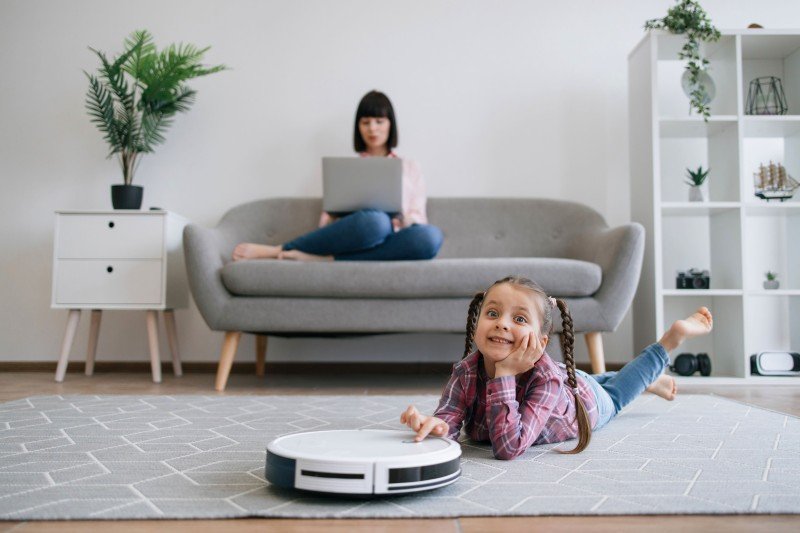Robotic Vacuum Cleaner Commercial: Revolutionizing Home Cleaning
In recent years, robotic vacuum have emerged as a cutting-edge innovation in home cleaning technology. With their automated functions and intelligent navigation systems, these gadgets have transformed the way individuals preserve cleanliness in their living spaces. This article aims to look into the performances, advantages, and future of robotic vacuum cleaners, showcasing their function in contemporary households.
Overview of Robotic Vacuum Cleaners
Robotic vacuum cleaners are autonomous gadgets designed to carry out cleaning jobs without requiring manual intervention. Utilizing sophisticated sensors, artificial intelligence, and a host of other technologies, these home appliances can navigate throughout a home, selecting up dirt, dust, and particles from various surfaces while avoiding challenges.
Secret Features of Robotic Vacuum Cleaners
Robotic vacuum cleaners come geared up with an array of features that boost their performance:
| Feature | Description |
|---|---|
| Navigation Systems | Employ various technologies like laser mapping and cameras to browse effectively |
| Automatic Charging | Return to docking stations to recharge when battery levels are low |
| Scheduling | Users can set cleaning schedules for particular times and days |
| Smart Home Integration | Get in touch with other smart gadgets for boosted functionality |
| Numerous Cleaning Modes | Adapt cleaning designs based upon the type of surface area being cleaned |
| App Control | Permit users to manage settings, get notices, and start/stop cleaning remotely |
Advantages of Robotic Vacuum Cleaners
- Time-Saving: With robotic vacuums, users can allocate their time to other essential tasks while the gadget manages the cleaning. This benefit is a significant selling point for busy homes.
- Consistent Cleaning: Robotic vacuum can perform everyday cleaning tasks, making sure that dirt and dust do not build up, resulting in a much healthier indoor environment.
- Energy Efficiency: Most robotic vacuums promote energy effectiveness, frequently using less power than traditional vacuum, thus lowering electrical energy expenses.
- Smart Technology: With functions like real-time mapping, users can monitor the cleaning process. Some advanced models even supply data on cleansings, such as areas covered and the quantity of dirt captured.
- Availability: Robotic vacuums are particularly beneficial for the senior or individuals with mobility concerns, streamlining the cleaning process without the need for physical exertion.
Drawbacks of Robotic Vacuum Cleaners
Regardless of their numerous benefits, robotic vacuum also have constraints:
- Limited Suction Power: While they are effective for day-to-day upkeep, they may not be as effective as standard vacuums for deep cleaning.
- Challenge Navigation: Some robotic designs might have problem with intricate designs, stairs, or high-pile carpets.
- Battery Life: Most robotic vacuums come with limited battery life, meaning larger homes may require multiple charging cycles to cover all areas.
- Expense: High-quality designs can be costly compared to standard vacuum cleaners.
Choosing the Right Robotic Vacuum Cleaner
With various options available in the market, choosing the right robotic vacuum cleaner can be a daunting job. Here are some factors to consider:
- Home Size: Larger homes may require designs with longer battery life and larger dust bins.
- Surface Types: Consider a model that works well on specific surfaces in your home, such as hardwood, carpet, or tiles.
- Smart Features: Evaluate the level of smart integration if you choose remote operation and tracking by means of a smartphone app.
- Brand name Reputation: Opt for trustworthy brands known for trusted products and good customer support.
Advised Robotic Vacuum Cleaners
| Brand name | Design | Key Features | Price Range |
|---|---|---|---|
| iRobot | Roomba s9+ | Advanced mapping, powerful suction | ₤ 949-₤ 1,099 |
| Roborock | Roborock S7 | Sonic mopping, adjustable cleaning paths | ₤ 649-₤ 749 |
| Eufy | RoboVac 30C | Affordable, strong suction, app control | ₤ 250-₤ 300 |
| Neato | D7 Connected | Distinct D-shape style, zone cleaning software application | ₤ 599-₤ 700 |
| Shark | IQ Robot | Self-emptying base, smart mapping | ₤ 599-₤ 699 |
Future of Robotic Vacuum Cleaners
As innovation advances, the future of robotic vacuum cleaners looks appealing. The combination of AI and artificial intelligence systems is expected to enhance navigation capabilities. Emerging trends include:
- Enhanced Interaction: Future designs may include integrated voice assistants, enabling users to release cleaning commands through voice.
- Enhanced Sensors: Enhanced sensors could cause much better obstacle acknowledgment, permitting the vacuum to work more effectively in chaotic spaces.
- Multi-Functionality: Future robotic vacuums might deal with extra chores, such as mopping or window cleaning, combining numerous cleaning jobs into one device.
FAQs About Robotic Vacuum Cleaners
1. How much do robotic vacuum usually cost?
The price can differ commonly, ranging from ₤ 200 to over ₤ 1,000, depending upon features and brand.
2. Can robotic vacuum cleaners clean carpets effectively?
Yes, many contemporary robotic vacuum are created with effective suction systems that can clean up different carpet types.
3. Do robotic vacuum cleaners need much upkeep?
Maintenance is fairly low; however, users must frequently clean the filters, empty dust bins, and periodically examine the brushes for clogs.
4. How long does robot vacuum cleaners on a single charge?
Most robotic vacuums can run for about 60 to 120 minutes, depending upon the model and cleaning conditions.
5. Can I schedule my robotic vacuum to clean when I'm not home?
Yes, most robotic vacuum feature scheduling features that enable users to set particular times for cleaning.
Robotic vacuum are not just devices; they represent a significant advancement in home cleaning technology. By making robot vacuum cleaner sale and more efficient, they allow users to enjoy a cleaner living environment with minimal effort. As technology advances, it is most likely that these devices will end up being even more sophisticated, leading the way for a smarter, clutter-free future.

